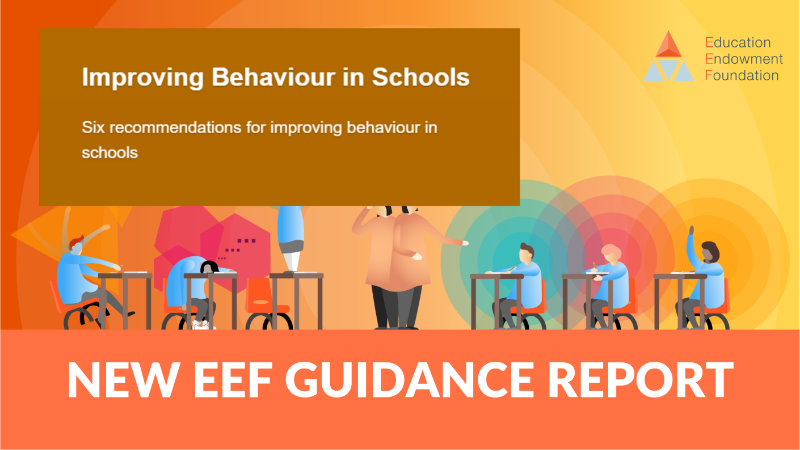Improving Behaviour in Schools
14 June 2019
New report from the EEF has been published.

The Education Endowment Foundation (EEF) have published their latest guidance report, Improving Behaviour in Schools
Misbehaviour in schools is not a new issue. And while most pupils in most lessons are well-behaved, it’s a major cause of stress for teachers which also has a lasting impact on the outcomes of the pupils in the class.
That's why the EEF have produced their latest guidance report, to support senior leaders to promote positive behaviour in schools, based on the best available evidence we currently have.
It offers clear and actionable recommendations in three key areas:
- Preventing misbehaviour happening - e.g. by providing breakfast clubs.
- Dealing with bad behaviour when it does happen - e.g. using personalised approaches like daily report cards.
- Consistency and coherence in school behaviour policies.

This report sits alongside the other 10 EEF guidance reports - focused on (for example) literacy, maths, digital technology and making best use of teaching assistants - which we hope offer you an actionable basis to improve teaching and learning in your schools.
The next EEF guidance report is on improving Secondary literacy.
Register here if you'd like to keep up-to-date with the EEF's latest news and resources by email
Please do highlight these guidance reports to your colleagues, and encourage them to use these and the EEF’s other key resources:
- Teaching and Learning Toolkit - an accessible summary of the international evidence on teaching 5 to 16 year olds, used by up to two-thirds of all schools.
- Assessing and Monitoring Pupil Progress - a guide to help track pupils' progress and assess their mastery of knowledge and concepts.
- Promising Projects - those EEF-funded projects which have demonstrated promising findings when first trialled.
This will help ensure these resources reach those of you on the front-line able to make a real difference to pupils’ learning.
If you would like to learn more about the EEF, or if you have any questions or comments about our work, please do not hesitate to email info@eefoundation.org.uk.
Contact Details
Email: info@eefoundation.org.uk